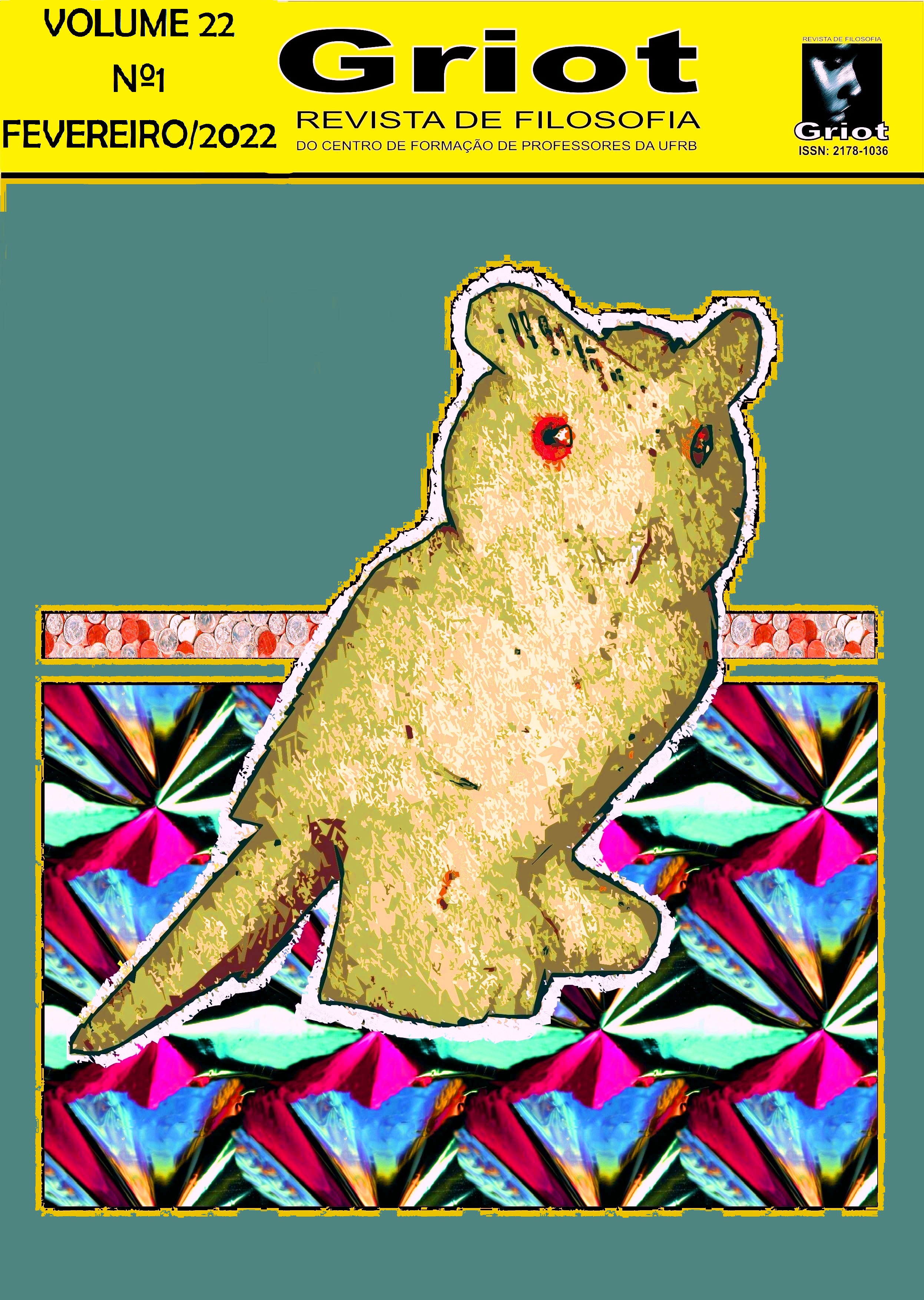The nietzschean “superman” and the transhumanism “superhuman”
DOI:
https://doi.org/10.31977/grirfi.v22i1.2756Keywords:
Nietzsche; Superman; Transhumanism; Superhuman.Abstract
Friedrich Nietzsche (1844-1900), who sought to understand very deeply an inner tension of human feeling, brought up the "superman" as a proposal for the overcoming of man through a force derived from the individual himself, in order to transvalue the dichotomies, errors and prejudices that denied existence, for the sake of its own affirmation. The proposal of overcoming man, announced by Nietzsche in the second half of the nineteenth century, returns later, but no longer through the idea of a force derived from the individual himself, but through his improvement by means of technological devices, promising to make man into a "superhuman". The following work intends to present two proposals for the overcoming of man, it is through Nietzsche and transhumanism philosophy. It is going to be shown that one of the two proposals comes by the idea that man must be overcome due to its decadence, seen by its denial of the world and its instincts, the other proposal is that man is not the final stage of evolution, therefore it must be overcome with tecnological enhacements.
Downloads
References
BOSTROM, Nick. A history transhumanist thought. Journal of evolution and technology, v. 14, n. 1, p. 1-25, 2005.
BOSTROM, Nick. Transhumanist values. Philosophical Documentation Center Press, 2003. Disponível em: <https://nickbostrom.com/ethics/values.html>. Acesso em: 05 de jul. 2021.
DIAS, R. M. Nietzsche educador. São Paulo – SP: Editora Scipione, 1991.
DUPUY, J-P. O transumanismo e a absolescência do homem. In: NOVAES, A. (Org.). A condição humana: as aventuras do homem em tempos de mutações. São Paulo: Agir, 2009.
FERRY, Luc. A revolução transumanista. Tradução de Éric R. R. Heneault. Barueri – SP: Manoel, 2018.
FRANCO, Edgar Silveira. O Manifesto da Arte Extropiana e a obra PRIMO 3M+: Proposta para um Corpo Pós-Humano. Disponível em: <http://www.compos.org.br/data/biblioteca_953.pdf>. Acesso em: 10 de nov. 2021.
GIZMODO. Tudo o que você precisa saber sobre a CRISPR, nova ferramenta de edição de DNA. Disponível em: <http://gizmodo.uol.com.br/tudo-o-que-voce-precisa-saber-sobre-a-crispr-nova-ferramenta-de-edicao-de-dna/>. Acesso em: 30 de nov. 2021.
LAURO, Rafael. Genealogia da moral – bom e mau, bom e ruim. Disponível em: Disponível em: <https://razaoinadequada.com/2014/09/09/genealogia-da-moral-bom-e-mau-bom-e-ruim/>. Acesso em: 10 de fev. 2021.
MORE, M. Principles of Extropy. Version 3.11 © 2003. Disponível em: < https://web.archive.org/web/20131015142449/http://extropy.org/principles.htm>. Acesso em: 27 de ago. 2021.
MORE, M. Transhumanism: toward a futurist philosophy. Disponível em: < https://pt.scribd.com/doc/257580713/Transhumanism-Toward-a-Futurist-Philosophy>. Acesso em: 15 de set. 2021.
MOTTA, Heuring Felix. Transhumanismo: o nascimento de uma nova humanidade! Disponível em: <https://www.conscienciacristanews.com.br/transhumanismo/>. Acesso em: 22 de nov. 2021.
MÜLLER-LAUTER, Wolfgang. A doutrina da vontade de poder em Nietzsche. Trad. Oswaldo Giacoia. São Paulo: ANNABLUME, 1997.
NATIONAL PUBLIC RADIO. Chinese scientist says he's first to create genetically modified babies using CRISPR. Disponível em: <https://www.npr.org/sections/health-shots/2018/11/26/670752865/chinese-scientist-says-hes-first-to-genetically-edit-babies>. Acesso em: 30 de nov. 2021.
NIETZSCHE, Friedrich. "Sämtliche Werke" (KSA). Hg. von G. Colli und M. Montinari. Berlin; New York; München: Walter de Gruyter, 1988.
NIETZSCHE, Friedrich. A gaia ciência. São Paulo: Companhia das Letras, 2007.
NIETZSCHE, Friedrich. A genealogia da moral. Tradução de Mário Ferreira dos Santos. Petrópolis – RJ: Vozes, 2009.
NIETZSCHE, Friedrich. A visão dionisíaca do mundo. São Paulo: M. Fontes, 2005.
NIETZSCHE, Friedrich. A vontade de poder. Tradução de Marcos Sinésio Pereira Fernandes, Francisco José Dias de Moraes; apresentação Gilvan Fogel. Rio de Janeiro: Contraponto, 2008.
NIETZSCHE, Friedrich. Além do bem e do mal. São Paulo: Companhia das Letras, 2005.
NIETZSCHE, Friedrich. Assim falava Zaratustra. São Paulo: Hemus, 1979.
NIETZSCHE, Friedrich. Aurora: reflexões sobre os preconceitos morais. Rio de Janeiro: Vozes, 2008.
NIETZSCHE, Friedrich. Ecce homo. Tradução de Paulo Cesár de Souza. São Paulo – SP: Editora Companhia das Letras, 1995.
NIETZSCHE, Friedrich. Fragmentos do espólio: primavera de 1884 a outono de 1885. Tradução de Flávio R. Kothe. Brasília: E. UnB, 2008.
NIETZSCHE, Friedrich. Fragmentos finais. Tradução de Flávio R. Kothe. Brasília São Paulo: Ed. UnB Imprensa Oficial, 2002.
NIETZSCHE, Friedrich. Humano, demasiado humano: um livro para espíritos livres. Tradução de Paulo César de Souza. São Paulo: Companhia das Letras, 2005.
NIETZSCHE, Friedrich. Sobre verdades e mentiras no sentido extra-moral (Obras incompletas). Tradução de Rubens Rodrigues Torres filho. São Paulo: Abril Cultural, 1983.
OS PENSADORES. Nietzsche. Tradução de Rubens Rodrigues Torres Filho. São Paulo: Abril Cultural, 1978.
ROCHA, Fabio. Epicuro e Nietzsche: filosofia para a vida. Disponível em: <http://filosofando-fabio-rocha.blogspot.com/2009/08/epicuro-e-nietzsche-filosofia-para-vida.html>. Acesso em: 23 de nov. 2021.
SAVULESCU, J.; BOSTROM, N. Human enhancement. Oxford: Oxford University Press, 2009.
SCHELER, Max. La idea del hombre y la historia. Disponível em: <http://html.rincondelvago.com/la-idea-del-hombre-y-la-historia_max-scheller_1.html>. Acesso em: 21 de fev. 2020.
SORGNER, S. L. Nietzsche, the overhuman and transhumanism. Journal of Evolution and Technology - Vol. 20 Issue 1 – mar. 2009. p. 29-42, 2009. Disponível em: <https://jetpress.org/v20/sorgner.htm>. Acesso em: Acesso em: 11 de ago. 2021.
VILAÇA, M. M.; DIAS, M. C. M. Transumanismo e o futuro (pós-) humano. Rev. Physis revista de saúde coletiva – Rio de Janeiro, 24 [2]: 341-362, 2014.
WELTE. Bernhard. “O super-homem de Nietzsche e sua ambígua questionabilidade”. In: Nietzsche e o cristianismo. Trad. Frei Fidélis Vering. Petrópolis: Vozes, 1981.
Downloads
Published
How to Cite
Issue
Section
License
Copyright (c) 2022 Tiago Xavier

This work is licensed under a Creative Commons Attribution 4.0 International License.
The authors who publish in Griot: Revista de Filosofia maintain the copyright and grant the magazine the right of first publication, with the work simultaneously licensed under the Creative Commons Attribution 4.0 International License, allowing sharing and adaptation, even for commercial purposes, with due recognition of authorship and initial publication in this journal. Read more...









































































